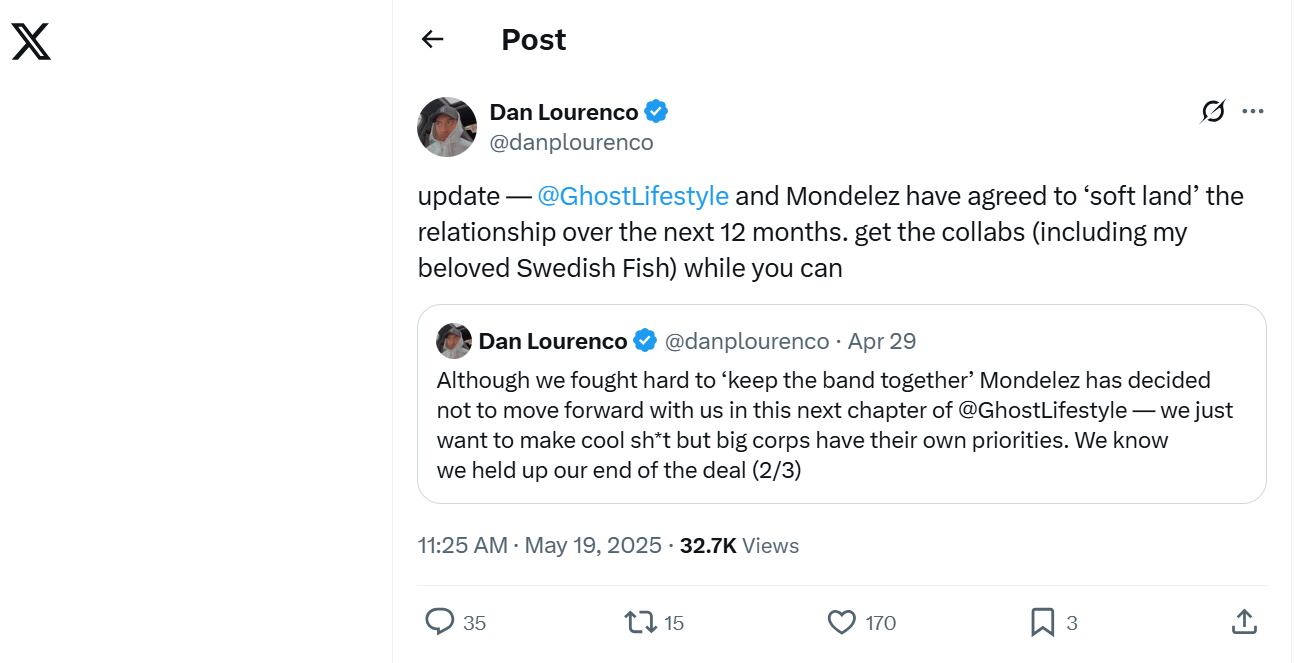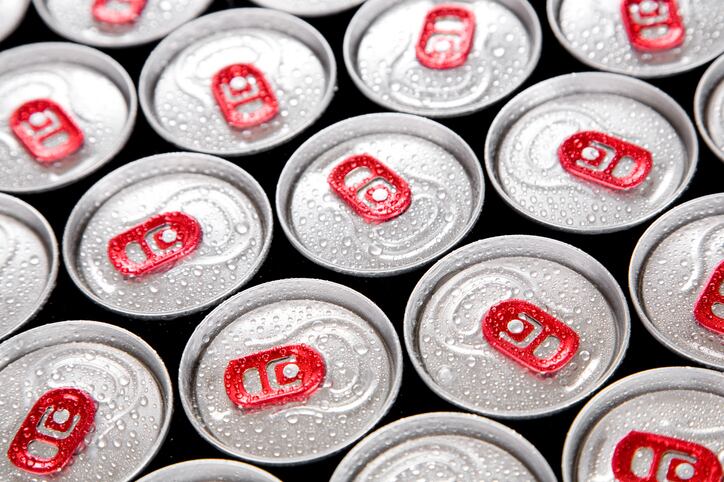In April, two Mondelēz International subsidiaries filed a lawsuit seeking to prevent GHOST LLC from marketing energy and protein products that feature trademarks from popular snack brands like Sour Patch Kids and Oreo. Now, the two heavy hitters have agreed to a “soft landing.”
The suit, filed in Illinois, claimed GHOST’s license to feature Mondelēz trademarks ended when Keurig Dr Pepper acquired GHOST because they did not seek permission before assigning their contractual rights over to Keurig Dr Pepper. However, Mondelēz alleges GHOST and Keurig Dr Pepper continued to market and sell its trademarked products.
Truce reached
On May 19, GHOST announced that the companies agreed to a “soft land” transition. In the initial lawsuit, Mondelēz asked the court to compel GHOST to destroy any co-branded products or marketing materials linked to Mondelēz trademarks. Now, GHOST and Mondelēz have agreed to gradually discontinue the flavor collaborations in protein and energy products over the next 12 months.

Background
Last fall, Keurig Dr Pepper announced plans to make the company’s largest investment to date, with the acquisition of GHOST for over $1 billion.
The original partnership between Mondelēz and GHOST expired in April. Mondelēz claims Keurig Dr Pepper continued to distribute co-branded GHOST products even after the official expiration of the agreement.
According to the suit, Mondelēz claims GHOST did not ask for permission to continue the partnership when Keurig Dr Pepper acquired GHOST, constituting a breach of contract.
Speaking to NutraIngredients last month, GHOST said, "We are disappointed Mondelez International has chosen to end a mutually-beneficial 7-year partnership. Additionally, we did not breach our contract, and we will strongly defend our position in court. We have a packed slate of exciting new flavors that will be on the way to our retail partners and GHOST fans shortly."
GHOST was founded in 2016 by Dan Lourenco and Ryan Hughes, with a focus on becoming a “lifestyle movement that includes transparent innovative products, global distribution, immersive content, key influencer partnerships and authentic collaborations.”
Some of those authentic collaborations include iconic brands like Bubblicious, OREO, Chips Ahoy!, Sour Patch Kids, Nutter Butter, Warheads and Swedish Fish, to name a few.
Collabs: A cautionary tale
Although GHOST’s license to feature Mondelēz trademarks ended when Keurig Dr Pepper acquired GHOST according to the suit, Mondelēz alleges GHOST and Keurig Dr Pepper continued to market and sell its trademarked products. The lawsuit also asserts the actions by GHOST would likely confuse customers by making them believe they’re affiliated with or connected to Mondelēz when no such connection exists.
This part of the complaint, according to attorney Katie Bond, partner at Keller and Heckman LLP, is a good reminder to companies that, even apart from the more traditional and more well-known intellectual property risks, using someone else’s brand name can comes with its own set of risks, especially from a deception perspective under state laws.
Commenting independently on the case, she said: “There isn’t a ton of case law on what might constitute a deceptive implied endorsement, but whenever one company uses another company’s brand name or logo, the question has to be asked, ‘Could this fit the bill?’ To be sure, there are some exceptions, like those allowing for comparative claims or a claim on a store brand saying ‘Compare to Brand X.’ But, companies still need to tread lightly.”
Where does GHOST go from here?
Brian Yam, vice president of quality & regulatory affairs at consultancy Blue Ocean Regulatory, said the case is a good example of how even the best partnerships do not last forever. He noted that the key takeaway for brands is to capitalize on partnerships beyond sales.
“It’s not just about increasing sales by capturing ‘Sour Patch Kid’ buyers, instead the value of the partnership should be seen as recreating a new sales funnel for the brand, and it’s about converting the ‘Sour Patch Kid buyers’ into ‘Ghost’ buyers.”
Yam pointed to Apple as an example, noting that the tech giant originally relied on Intel Chips for all its Macbooks and desktop computers before later revealing that behind the scenes, it had been working to develop its own Apple Silicon Chips, ultimately blowing the competition away.
“The same goes with supplement brands,” he said. “Now that we’ve captured ‘Sour Patch Kids’ buyers, R&D should be focused on turning these buyers into ‘Ghost buyers’. Can they create their ‘Sour Patch Kid’ or tangent version of this flavor? Or perhaps a better, more exciting flavor than Sour Patch Kid?”
While it may not be the same, Yam said he does see this practice in retail, where a grocery chain will offer their own private label version of the branded product (e.g. Kirkland signature), and over time the private label has evolved from a “budget” option to an equivalent or even an upgrade to the branded product.

